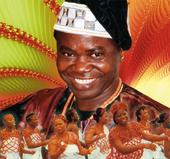Chief Udoh Essiet was born on November 21,1959. He was the seventh child of a Protestant pastor in Ikot Ekpene, a village in the southeast of Nigeria. His first instruments, he says, were the kitchen door and tins of condensed milk. Not long after, he graduated to the traditional hollowed log drum called "abodom." He performed with the local traditional musicians where he learned to "speak" with his instrument to the dancers and direct their movements.
The Biafra-Nigeria civil war (1967-1970) scattered his family and interrupted his formal education, causing him to migrate west to the teeming urban center of Lagos. By chance (he was selling tooth-cleaning sticks on the street) he met the Highlife Band leader Dr. Victor Olaiya, who is still performing today at his Stadium Hotel in Lagos. Olaiya's band had been a step in the careers of many future African stars, including Fela Anikulapo Kuti. Soon young Udoh was living with the bandleader and his family like an adopted son. He would carry Olaiya's trumpet. Quickly he was allowed to play maracas with the band. He wanted to learn the trumpet but Olaiya told him, "Play rhythm first." One day that the band's conga player was absent, Udoh filled in, but he had to stand on a beer bottle crate to reach the drums. The conga player never got his job back. Olaiya's band toured Nigeria extensively and played all styles of African popular music, as well as Africanized versions of American rhythm and blues hits.
But the specialty of the band was and still is West African Highlife. Highlife is an urbanized fusion of "palm wine" guitar-picking style and traditional native song with Big Band and Calypso influences from the 78rpm records that had arrived in Africa. The instrumentation resembles Latin big bands (though keyboards are rare in the 50's and 60's) but the rhythms and arrangements have an African logic all their own. Without Highlife, there would be no Juju or Afrobeat or the other more contemporary Nigerian styles. There is a lot more to be learned about Highlife, but Chief Udoh was in the right place at the right time to get the best education. During his years with Olaiya, he met and played with the greatest Highlife stars of that golden period, including Rex Williams, E.T. Mensah and Rex Lawson.
Chief Udoh also played with King Sunny Ade and other Juju musicians, before joining the band of the creator of Afrobeat, Fela Anikulapo Kuti, as conga soloist. For three years he toured, performed and recorded with Fela. After he left Fela's band, no one else was able to fulfill his role. Eventually Fela would just play the three solo congas (which are played with sticks) onstage by himself.
Some young Frenchman traveled to Lagos by road and made a film of their journey that included a swinging soundtrack and footage of Udoh and other local musicians. They called the film "Ghetto Blaster" and sold it to French television. They returned to Nigeria with a plan to bring their "group" to Paris. The band lived like a family on a houseboat on the Seine, composing and practicing in public in the African style. They appeared on another TV special, toured in France and Europe, recorded a single for Chris Blackwell on Island Records, and eventually released an album called "People". Chief Udoh..s contribution to the group was to apply Afrobeat rhythm and arranging (which come from Highlife) to the funk style that fascinated the other young Africans in the band. In 1986, Jane Kramer of "New Yorker" magazine did a feature on the band and wrote that Chief Udoh was the "Africa" of the group. In 1987, Udoh left Ghetto Blaster over artistic differences, and one year later the group disbanded.
Chief Udoh accompanied other African stars based in Paris, such as Mory Kante, Salif Keita, Kasse Mady and Sorry Bamba. In 1989 he formed his own group, Afrobeat Blaster, with his wife Sherry Margolin (an American who is the sister of Blues artist Bob Margolin) on keyboards and vocals. They composed original Afrobeat material, released an album ("No Condition Is Permanent") and toured in Europe. And at the same time, Udoh resumed performing more traditional Highlife, this time as the front man. He is a charismatic, energetic singer and showman who sings in several Nigerian dialects and in "pidgin" English. The album "Time For Highlife" was completed in March 1999. The band plays regularly in France and internationally. The album "Highlife Crossing" will be released in 2007. Check out the Pics to see his band onstage at a recent show.
